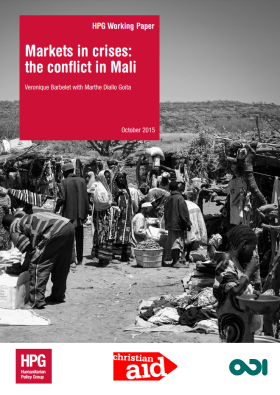Markets in Crises: The Conflict in Mali
Humanitarian agencies routinely conduct market analyses to inform decisions around transfer modality – cash, voucher or in-kind – with a strong emphasis on the availability and price of key commodities.
However, in the last few years humanitarian organisations have expanded their scope to incorporate supply chain analysis, value chain analysis and pre-crisis market mapping in an effort to strengthen their understanding of how markets function more broadly. This study constitutes a continuation and reaffirmation of this trend. It asks whether a more sociological perspective can highlight changes and issues not captured by current approaches to market analysis, and what this might mean for humanitarian response.
This Working Paper explores the impact of the recent conflict in Mali on markets in the north of the country. It proceeds from the belief that humanitarian market analysis needs to become more sophisticated and more sensitive to a wider range of issues if humanitarian interventions are to support markets and help them function during crises.
The study revolves around three main issues: how markets and market actors adapt during the crisis; how far people derive resilience, or become vulnerable, as a result of market activities; and how humanitarian aid affects markets, and what impacts this has on households?



